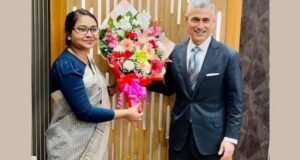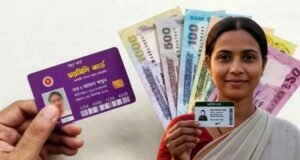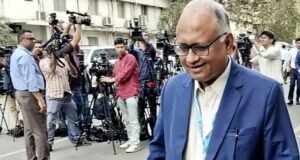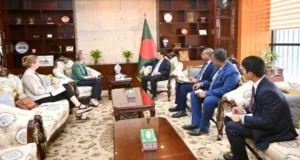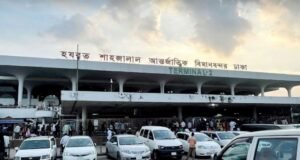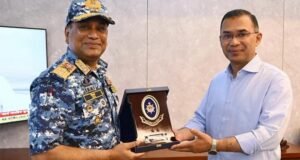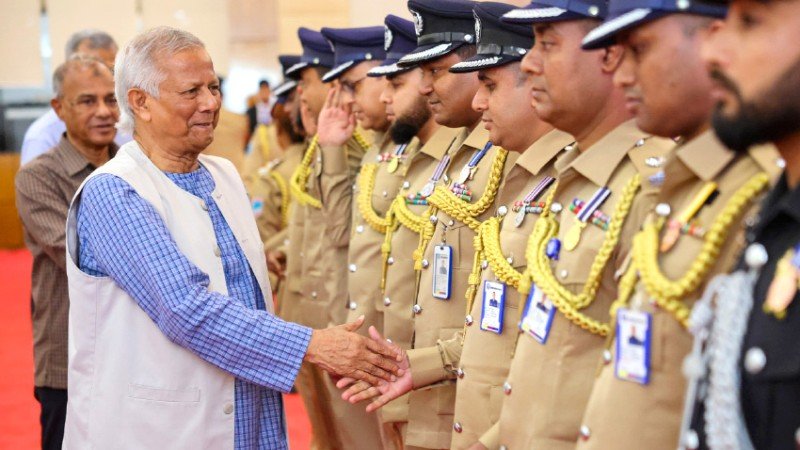
Chief Adviser (CA) Dr. Muhammad Yunus has said that over the past 15 years, Bangladesh police force was politicized and used as a partisan tool, resulting in widespread public resentment.
He made the remarks on Tuesday while inaugurating Police Week 2025 at Bangladesh Police Auditorium in Dhaka’s Rajarbagh.
“Over the last 15 years, police were turned into a political force,” said Dr. Yunus. “By following illegal orders, they faced the wrath of people. Now, they must play a vital role in ensuring human rights and justice.”
Highlighting the importance of them in building a just and peaceful society, he stated, “The world gauges our level of civilization by observing actions and relationships between our police and public. We want to reach the highest standards of civilization, and police are a key driver of that journey.”
Dr. Yunus emphasized restoring public trust, saying, “Our expectation is for Bangladesh Police to be admired both at home and abroad.”
Recalling the legacy of resistance, the Chief Adviser noted that on the night of March 25, 1971, it was the Bengali police who first stood in armed resistance at Rajarbagh, marking a proud chapter in the nation’s history.
He added, “Under the authoritarian regime of past 15 years, the entire system collapsed due to misuse of them. Even many honest officers had to bear the consequences.”
Dr. Yunus said that when the interim government took charge in August, law and order situation was fragile and public trust in police was at an all-time low. To address this, initiatives were taken to restore order on roads and highways, launch special operations, and strengthen police-community engagement.
He praised police for their contributions in maintaining peace during major national events like Durga Puja, Eid-ul-Fitr, Bishwa Ijtema, and Bengali New Year.
The Chief Adviser urged the force to show heightened sensitivity toward preventing violence against women and children, calling for reliable hotline support. “A country can only claim to be secure when its women and children feel safe,” he stated.
While acknowledging challenges such as manpower shortages, budget limitations, and logistical constraints, Dr. Yunus said the biggest challenge is bridging the trust gap between police and people—a gap built over the past 16 years.
“Building that trust is not impossible,” he said. “It just needs a sincere effort.”
He called on police to serve as friends to people, working from the grassroots to top level to build public confidence. “We have already begun reforms and welfare measures for frontline officers,” he added.
On the upcoming elections, Dr. Yunus reiterated his commitment: “The 13th National Parliamentary Election will take place between December this year and June next year. It is your responsibility to ensure that it is fair and peaceful. Every candidate should be treated equally and every voter must feel safe casting their vote.”
He warned, “No one who wins through injustice can ever uphold justice. Do not allow yourselves to be used by any political force.”
Addressing the sensitive pre-election period, he added, “Opposing forces may try to destabilize the country. Stay vigilant.”
Dr. Yunus praised police for their restraint during various recent protests and expressed hope for continued patience and professionalism, saying, “It is time to build the image of police as a friend of people. It is difficult, but it is just, and absolutely necessary.”
He welcomed the new initiative of holding dialogue sessions with religious leaders, journalists, and community representatives during Police Week. “Such meetings should be regular, not just annual,” he said. “They promote mutual understanding and reduce the gap between police and the public.”
The event was attended by Home Affairs Adviser Lt. Gen. (Retd.) Md. Jahangir Alam Chowdhury, Special Assistant to the Chief Adviser Md. Khoda Baksh Chowdhury, Inspector General of Police Md. Baharul Alam, and Public Security Division Senior Secretary Nasimul Ghani.
 Weekly Bangla Mirror | Bangla Mirror, Bangladeshi news in UK, bangla mirror news
Weekly Bangla Mirror | Bangla Mirror, Bangladeshi news in UK, bangla mirror news


